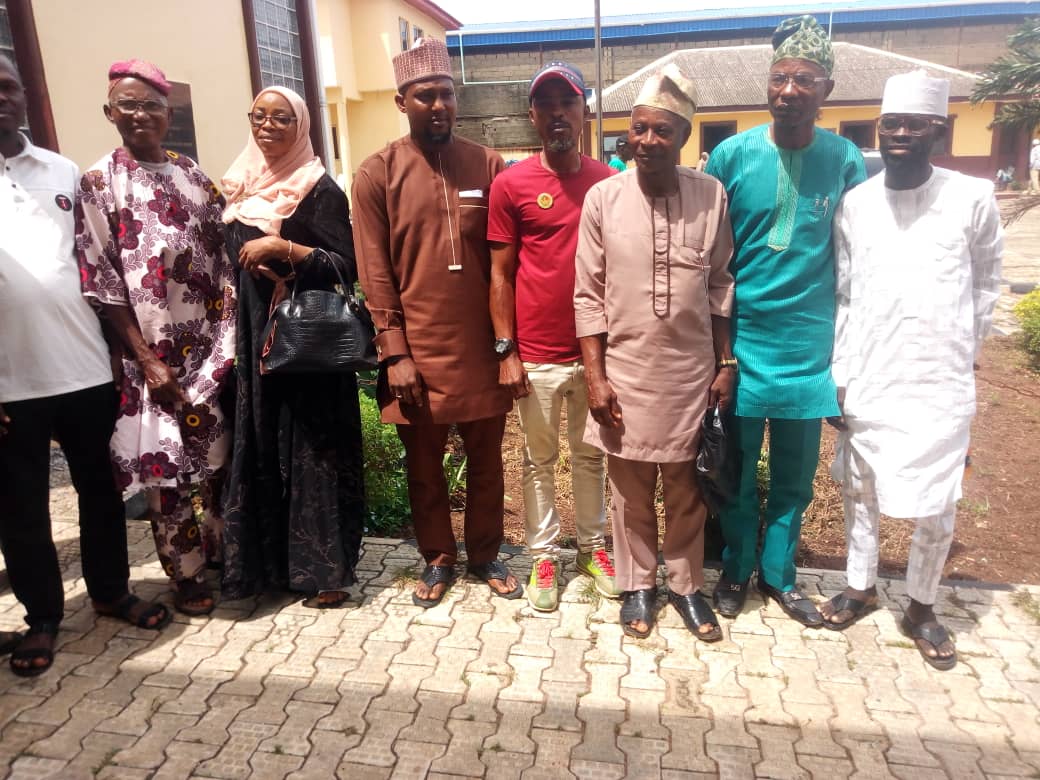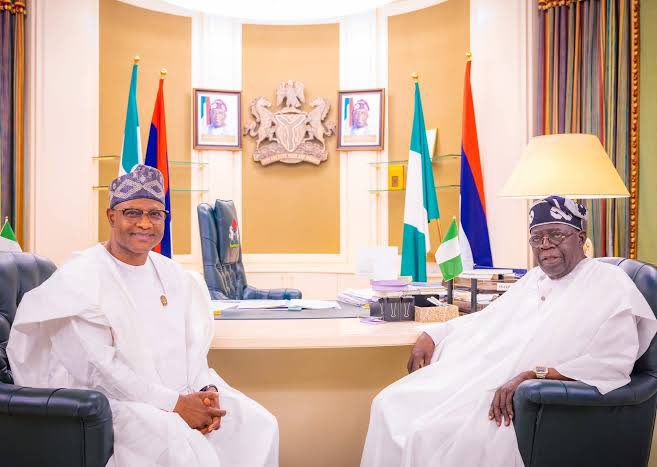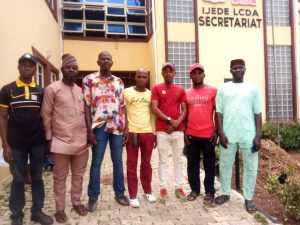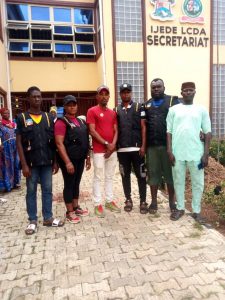Politics
2023: Youths urged to play active roles in politics

2023: Youths urged to play active roles in politics
By Ifeoma Ikem
Stakeholders and youth leaders have called on Nigerian youths to wake up to their responsibilities and get involved in politics, if they want to see positive changes in the country, as the future of the nation depends on them.
The stakeholders made the call at the 2nd,a day Political Symposium held in Ijede Local Government Council Secretariat Ikorodu, Lagos, with the theme; Free and Fair Election; The Roles of Youth in Politics.
Prince Sodiq Afinah, a Senior Registrar Lagos State University said that the programme which was organized by Ijede /Egbin youth forum was to sensitise the community on the need for youths to be properly tutored, educated and involved in the process of administration.
“People will tell you that politics is a dirty game, I don’t want to get involved, I don’t want to tarnish my image and trample on my integrity.
“No! politic is something very vital that all must be involved in, it is a process of electing those that will govern and administer our affairs so whoever we elect will be the one to determine the rate of development in our community.
“The world is now a global community where one can make an impact any where in the world, so the youth must be involved in electing those that will be our leader, it’s not by force, it is a strategic process”, he added.
He said that some of the steps the youths can take include to first get registered in a political party of his or her choice at grassroot level.
“Attend meetings so that they can make their own meaningful contributions, also get registered for PVCs because no matter how vibrant and knowledgeable you are, if you don’t vote that means you can’t elect those that will lead you in the state”.
He pointed out that it’s no longer a situation where touts take over and scare people away during elections but that people’s votes will definitely count because there is a new change so everyone should be encouraged.
“We are the electorates, we are going to determine those who will lead us, let us not be afraid of anything, just do your part at the polling boot, they would want to scare and discourage us but let’s make sure we maintain our stand and wait till the end so we can count our votes before we leave.
He advised the youths to make sure they vote the right candidates that have the interest of the masses at heart.
Another Speaker, princess Khafila Hassan, the chairman ICAN Ikorodu branch, described politics as the activities involved in creating and using power to take decisions concerning the country and taking the country to a better position.
According to her, we cannot separate governance from politics because they walk together.
” For us to get a healthy nation, we have to still pass through the grassroot levels to ensure a healthy nation which starts with us and how we elect leaders into positions at all tiers of government.
“Fortunately, we are getting towards another year where we would decide who becomes our leaders, so let’s be involved and not leave it to those who are manipulating the processes.
“Let’s elect leaders who we are sure of their profiles and electing the right persons into leadership positions as only then will lives be secured.
” Only then will we have good electricity and companies that will create employment for the youths because they are a lot of graduates roaming around the streets now.
“it would also fix our health centers and borders which is another major problem causing insecurity in our nation thereby making our country a dumping ground for unwholesome products,” she added.
She said that security should be the major priority of government so that everyone would be free from danger and have freedom from fear.
“Government should ensure that power sectors are functioning and the issues of bad governance addressed.
“I will advice Nigerians especially the youths to be involved in the selection processes of our leaders, we have to vote and come out as well to be voted for”.
Comrade Matti Olakunle of the stakeholders in youth forum of Ijede said that one of the roles youth can play to have a better society is what the Ijede Egbin youths forum is doing currently.
” We are sensitizing people on their role in elections, calling facilitators to come and enlighten and also encourage them to get their PVC because it’s through this PVC that they can express themselves during the general election in 2023.
“We should not allow ourselves to be used and induced with money because during elections some politician will give N1000 and steal your future.
“These N1000 -N2000 and other items are nothing but a Greek gift that they will use to steal one’s progress and development.
“I will plead to the youths to shun violence and participate actively in votes and to defend their votes to ensure that they elect a candidate who has a record of integrity that will provide infrastructure and social values which the society need.
He pleaded with the youths to elect people with impeccable characters and integrity that will lead the society.
” If the politics is right, the society will be right, if it’s wrong in it’s administration what you get out of it will be wrong.
“I wish the Ijede youth forum success especially the leaders, they have been doing wonderfully well, defending the interest of the youth and the community, I can acknowledge that and bear witness and I pray that God will continue to support them”.
Mr Bashir Saminu, another speaker said the youths should show commitment to change the narrative of the present happenings in the nation.
Saminu charged the youths to take drastic steps in doing the right thing, as much could be achieved if they do the right thing at the right time.
“Bad governance is one of the causes of poverty, if there be good governance the rate of poverty will definitely reduced in our country”.
He urged the youths to identify the right person with integrity who is seeking political office not someone trying to influence or beg for vote from the electorate after the election they will enrich themselves and their families.
” Instead of campaigning for what they would do, they prefer to give inducement, money and food items to influence people to vote for them.
“The money which could have been used for good roads and other things are all now diverting to personal gains,” he said
“Get your PVC as a weapon do not wait until the day of election
“If I am rich, you are rich then who will I give money to, they won’t be able to use anyone for their own selfish gains it’s called social function,” he added
The coordinator of Ijede Egbin youth, Prince Olumide Musediq said that the purpose of the event was to educate, re-orient the people especially the youths on their rights to vote and also how people will make their votes count.
Musediq pointed out that many people no longer believe In the voting system but that if this kind of orientation is going on in each states, the youths will believe and have ideas with a change of mindsets thereby making them to partake legitimately in election processes.
“I will use this opportunity to call on Nigerian youths to take serious steps towards full participation in political and electoral processes in order to change the current situation of the country.
“Also my message is an appeal for all youths to be mindful, watchful and careful. We are expecting a better youth in our community.
” Gone are the days when youths believe that if they don’t add violence, they will not have their means of sustaining themselves, with this programme, we are going to have a better youth, many were touched and impacted including me.
news
Journalists for Good Governance Shines Searchlight on Local Government Administration

Journalists for Good Governance Shines Searchlight on Local Government Administration
…Calls for Accountability in Nigeria’s Grassroots Governance
LAGOS, Nigeria — A civil society coalition known as Journalists for Good Governance(JGG) has intensified public debate on transparency and accountability within Nigeria’s local government system, urging media professionals, civil society actors, and citizens to hold grassroots leaders accountable.
Speaking an event in Lagos recently, the acting chairman of the society, Comrade Bunmi Obarotimi said that despite reforms such as the Supreme Court’s 2024 ruling granting financial autonomy to all 774 Local Government Areas (LGAs), systemic challenges continues to hinder effective service delivery and responsible stewardship of public funds.
“Local governments are the closest tier of government to the people — yet too often they remain the least transparent. Without civic oversight and vibrant media, promises of autonomy ring hollow.” the acting chairman said.
The Journalist for Good Governance emphasised crucial roles that journalists can play in uncovering discrepancies in council spending, flagging poor service delivery, and educating citizens on their rights. Their call comes amid wider efforts by media and civic organisations to bridge accountability gaps. The civil society initiatives had previously launched monitoring campaigns to track local government expenditures and have been quietly advocating for transparency in how public money is deployed.
The leaders of the Journalists for Good Governance (JGG) highlighted the importance of physical assessment and citizens engagement on projects to boost people’s confidence, urging local councils to adopt open data platforms and proactive information dissemination in compliance with the Freedom of Information Act. Experts say the majority of LGAs currently lack operational websites or digital portals, further limiting public scrutiny.
The Journalists for Good Governance initiative aligns with sustained advocacy by civil society groups and governance experts calling for a collective approach to strengthening democratic accountability, and has decided to engage in critical and holistic assessments of how Local Governments is being run and the impact and quality of projects they embark-on and to address deficits in transparency and public trust.
Meanwhile, some state governments have signalled support for improved community engagement. In Lagos State, authorities reiterated a commitment to enhancing community media platforms as vehicles for civic participation and accountability at the grassroots level.
The renewed spotlight on local government administration has reignited public debate over fiscal responsibility and priorities. Controversies such as the widely criticised Adamawa council chairmen’s wives trip to Istanbul — which drew public outrage for perceived misuse of public funds — underscore why watchdog groups say stronger oversight mechanisms are urgently needed at the grassroots.
Citizens and activists have welcomed the journalists’ initiative, calling for sustained media engagement that goes beyond headlines to influence policy and accountability reform.
The civic rights advocates note that real change will require robust legal frameworks, a free press, and empowered communities equipped to demand transparency at every level of governance.
As Journalists for Good Governance mobilises its members, the coming months are likely to see heightened media attention on grassroots administration — from council budgets and service delivery to the enforcement of public information laws and digital transparency initiatives.
Politics
Gov. Dauda Lawal commissions projects in Anka LGA, Commits to Sustainable Development

Gov. Dauda Lawal commissions projects in Anka LGA, Commits to Sustainable Development
The Executive Governor of Zamfara State, Dr. Dauda Lawal, has reiterated his administration’s steadfast commitment to guiding Zamfara State towards sustainable development by inaugurating and initiating a series of pivotal projects in the Anka Local Government Area.
Among the key undertakings announced are the comprehensive reconstruction and modernization of the Emir of Anka’s palace, signaling a revitalization of traditional leadership; the initiation of work on the crucial Anka–Abbare Road, which is expected to significantly improve connectivity; and the construction of a new Local Government Secretariat.
Additionally, the projects encompass the establishment of dedicated offices for the Hisbah Commission and the Community Protection Guards, alongside the reconstruction of the Safe School in Anka, emphasizing the administration’s focus on enhancing educational infrastructure.
During the commissioning event, Governor Lawal highlighted that these projects are a fulfillment of commitments made during his campaign, aimed at transforming the local landscape by improving infrastructure, stimulating economic growth, bolstering public service efficiency, and enhancing the capacities of security agencies. He called for a collective effort from the community to ensure proper maintenance of these facilities, underscoring the shared responsibility in preserving public assets.
Governor Lawal shared that similar projects have also been inaugurated in Tsafe, with plans for upcoming projects in Kaura Namoda, Moriki, Bungudu, Bukkuyum, and Zurmi, all expected to be completed and inaugurated by the year’s end. This ambitious timeline reflects the administration’s urgency in addressing the development needs of various regions within the state.
In his remarks, the governor urged residents and local traditional institutions to collaborate closely in maintaining the newly commissioned structures and supporting the overarching objectives of his administration. “I stand here in Anka today to honor our commitments to the people of Anka Local Government and all of Zamfara State. The official opening of the new palace for the ‘Sarkin Zamfaran Anka’ and the Zamfara State Council of Chiefs is a significant milestone that wraps up today’s agenda,” he stated.
Governor Lawal emphasized the strategic importance of the Anka–Abbare Road, describing it as a critical artery that will not only enhance access to remote areas but also stimulate economic activities and generate multiplier effects throughout the local economy. He articulated the necessity of providing a conducive work environment for civil servants, affirming that the new local government secretariat and dedicated offices will significantly contribute to strengthening law and order within the state.
“Education is the cornerstone of any thriving society. Our focused initiatives are oriented towards fostering a safe, secure, and supportive environment for our students. I am also proud to announce the completion and commissioning of the reconstructed SAFE School Anka today,” he remarked, reaffirming the administration’s dedication to education.
The governor further noted that the commissioning of the Emir’s Palace serves to restore the historical prominence of traditional institutions, which he regards as pivotal custodians of the region’s culture and heritage. He underlined the administration’s awareness of the invaluable role that these institutions play in fostering the state’s growth and emphasized the necessity of aligning development projects with cultural values.
In conclusion, the governor mentioned that after the successful commissioning in Anka and Tsafe, future projects in Kaura Namoda and Moriki will follow suit, while those in Bungudu, Bukkuyum, and Zurmi remain on track for completion and official commissioning before the year concludes.
news
GEN CHRISTOPHER GWABIN MUSA SUPPORT INITIATIVE HAILS GOVERNOR UBA SANI’S APPOINTMENT AS RENEWED HOPE AMBASSADOR

GEN CHRISTOPHER GWABIN MUSA SUPPORT INITIATIVE HAILS GOVERNOR UBA SANI’S APPOINTMENT AS RENEWED HOPE AMBASSADOR
The Gen Christopher Gwabin Musa Support Initiative (GCGMSI) has extended its warm congratulations to His Excellency, Mallam Uba Sani, the Executive Governor of Kaduna State, following his recent appointment as a Renewed Hope Ambassador and Deputy Director-General for Party Outreach, Engagement, and Mobilisation by the All Progressives Congress (APC).
This felicitation was formally conveyed in a statement signed by the Initiative’s Convener, Ibrahim Dahiru Danfulani, Sadaukin Garkuwan Keffi/Betara Biu, and disseminated to the press.
The statement highlighted that the Grand Patron of the GCGMSI, His Excellency General Christopher Gwabin Musa, OFR, Minister of Defence of the Federal Republic of Nigeria, received the news of the appointment with great pride but without surprise. According to the statement, General Musa expressed unwavering confidence in Governor Uba Sani’s proven capability and salient leadership qualities, affirming that the Governor is eminently equipped to deliver on every task entrusted to him.
The Grand Patron further extended profound appreciation to the President and Commander-in-Chief of the Armed Forces, His Excellency Asiwaju Bola Ahmed Tinubu, GCFR, for recognising and finding Governor Uba Sani worthy of this critical national assignment. The appointment, which takes effect immediately, was made by the President in his capacity as the leader of the APC, citing the Governor’s exceptional organisational abilities and strategic acumen.
In his new role, Governor Sani is tasked with working in close collaboration with the Director-General of the Renewed Hope Ambassadors and the party hierarchy, including the National Chairman of the APC. His primary mandate is to ensure harmony, inclusiveness, and strategic coordination across all levels of the party’s mobilization and engagement architecture, a vital function for advancing the political agenda.
Demonstrating its commitment to national service and effective governance, the GCGMSI, under the direct directive of its Grand Patron, General Musa, has officially mobilised its formidable structure. The Initiative has pledged the full deployment of its extensive network, seasoned personnel, and robust operational framework to assist and support Governor Uba Sani in the successful execution of his new responsibilities.
The Gen Christopher Gwabin Musa Support Initiative, renowned for its disciplined organisation, widespread grassroots penetration, and capacity for large-scale civic mobilisation, stands ready as a pivotal force. This move underscores the GCGMSI’s pivotal role as a key support system for national development initiatives and its unwavering dedication to fostering unity and progress under the Renewed Hope agenda.
-

 celebrity radar - gossips6 months ago
celebrity radar - gossips6 months agoWhy Babangida’s Hilltop Home Became Nigeria’s Political “Mecca”
-

 society6 months ago
society6 months agoPower is a Loan, Not a Possession: The Sacred Duty of Planting People
-

 society5 months ago
society5 months agoReligion: Africa’s Oldest Weapon of Enslavement and the Forgotten Truth
-

 news6 months ago
news6 months agoTHE APPOINTMENT OF WASIU AYINDE BY THE FEDERAL GOVERNMENT AS AN AMBASSADOR SOUNDS EMBARRASSING










